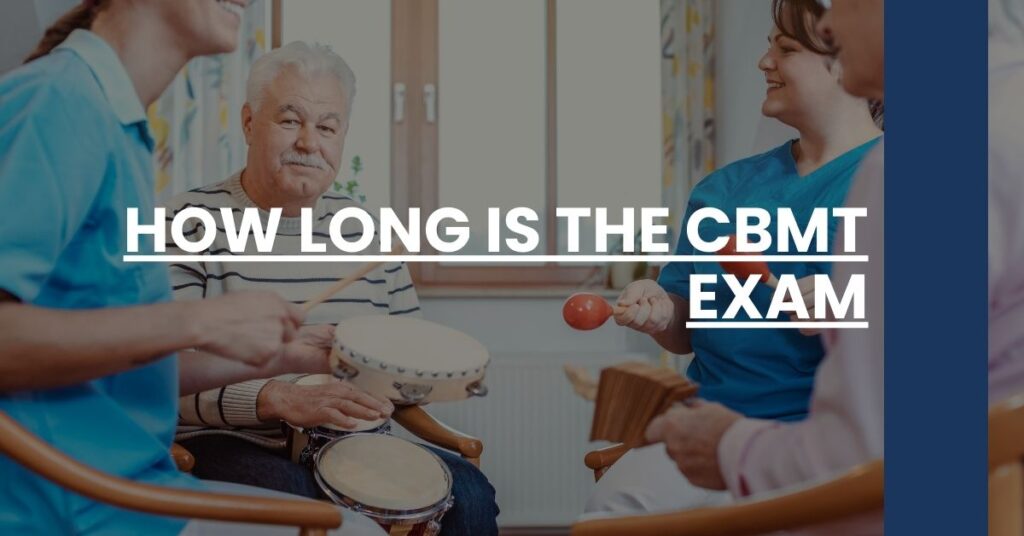The CBMT Exam, essential for music therapists pursuing board certification, spans three hours. Tailored to encompass a variety of knowledge areas within the field, the test comprises 150 multiple-choice questions.
If time management during standardized tests has been your nemesis, fear not. The strategies distilled in this article will help ensure you approach every question with poise and purpose, transforming pressure into prowess.
Curious to maximize your prep time for success on the exam day? Keep reading, as we unpack efficient study techniques and realistic test-taking tactics that align with the CBMT Exam’s clock.
Expect to walk away with more than just the duration; arm yourself with the insights to conquer every minute of the journey to becoming a Music Therapist-Board Certified (MT-BC).
- What Is the CBMT Exam?
- Breakdown of the CBMT Exam Structure
- How Long Is the CBMT Exam?
- Tips for Managing Time During the CBMT Exam
- Preparation Strategies for the CBMT Exam
- Exam Day: What to Expect
- After the Exam: Next Steps
- Frequently Asked Questions About the CBMT Exam
- Accessibility and Accommodations for the CBMT Exam
- Keeping Your CBMT Credentials Current
- Conclusion: The Role of the CBMT Exam in Your Music Therapy Career
What Is the CBMT Exam?
Before you can call yourself a music therapist-board certified (MT-BC), you must tackle the Certification Board for Music Therapists (CBMT) Exam. This standardized assessment evaluates your understanding of music therapy principles and your readiness to practice as a qualified professional.
The CBMT exam ensures that those who pass meet the high standards required to provide effective, ethical, and safe music therapy services. It’s the capstone to your rigorous academic and clinical training, designed to protect the public by ensuring consistent, competent care across the music therapy profession. Passing the CBMT exam grants you the MT-BC credential, which is widely recognized in hospitals, schools, and private practices—a testament to your dedication and expertise in the field.
Breakdown of the CBMT Exam Structure
Delving into the CBMT exam, you’ll find it’s composed of 150 multiple-choice questions that each plays a crucial role in assessing your grasp of music therapy. The questions span various topics, from foundational knowledge to specific clinical practices and professional responsibilities.
Each question corresponds to one of the following areas:
- Clinical Practice
- Theoretical Foundations
- Analytical & Technical Skills
- Professional Development
How you navigate these sections will influence not just your score but also how effectively you can demonstrate your capabilities as a future music therapist. Understanding the framework is essential in tailoring your study approach effectively.
How Long Is the CBMT Exam?
If you’re wondering, “How long is the CBMT exam, and what time commitment am I looking at?” here’s your straightforward answer—three hours. It might seem daunting initially, but when you break it down, that’s about 1.2 minutes per question. So, pacing yourself is pivotal; with a calm, steady approach, you can tackle each question thoughtfully and avoid rushing through the exam.
Tips for Managing Time During the CBMT Exam
Time management could be your best ally or your greatest challenge on exam day. Here’s how to make it work for you:
- Start Strong: Begin with the questions you find easiest. This builds confidence and ensures you bank a few correct answers early on.
- Watch the Clock: Keep an eye on the time but don’t obsess over it. Aim to complete about 50 questions every hour, adjusting your pace if needed.
- Skip Strategically: If you’re stumped, don’t linger. Move on and return to tricky questions later if time permits.
- Final Sweep: Use any remaining time to review your answers, especially the ones you were uncertain about.
Mastering the rhythm of the CBMT exam could be the difference between walking away as a board-certified music therapist or having to retake the test. Music Therapy Ed’s Exam Prep Workshop also suggests practical techniques that could further sharpen your time management skills for the exam.
Preparation Strategies for the CBMT Exam
Preparing for the CBMT exam is no small feat, but with the right tactics, you can face it with confidence. Here’s how to gear up effectively:
- Begin Early: Give yourself plenty of lead time to prepare. Cramming is not your friend here.
- Use Study Guides: The CBMT Self-Assessment Examination can be a gold mine for identifying strengths and areas for improvement.
- Practice, Practice, Practice: Mimic exam conditions with practice questions to build familiarity with the format and question style.
- Build a Study Group: Collaborate with peers for mutual support and knowledge exchange.
- Prioritize Your Well-being: Focus on sufficient sleep, nutrition, and stress management techniques. Your brain needs to be in top form.
Each preparation step is a building block towards conquering the three-hour CBMT exam. As you close in on your exam date, remember that structured, diligent preparation will set you on a path to success.
Exam Day: What to Expect
Preparing for the CBMT exam is only part of the equation; understanding the logistics of exam day is equally crucial. On test day, arrive early—give yourself a buffer to handle any last-minute jitters and get comfortable in your surroundings. Having a clear mind before starting the clock can significantly impact your performance.
Here’s a succinct checklist to set you up for a smooth exam day:
- Identification: Bring a government-issued ID to verify your identity.
- Exam Authorization: Have your exam authorization letter ready.
- Essentials: Pack a few pencils, an eraser, and a small clock if digital devices are not allowed.
- Comfort Items: Include a light sweater in case the room temperature fluctuates.
- Snacks and Water: These can be crucial, especially if you’re susceptible to low energy or anxiety.
Although breaks aren’t formally embedded within the CBMT exam timeframe, knowing you are prepared for the duration helps maintain concentration. Remember, the clock won’t pause, so use your time wisely. Focus on the questions and don’t let distractions divert your attention from the task at hand.
After the Exam: Next Steps
As you submit your answers and the proctor concludes how long the CBMT exam lasts for you—a smooth three hours—you might wonder, “What happens next?” While the weight of the questions is lifted, a brief waiting period precedes the arrival of your results.
Deservingly, take a moment to acknowledge the effort you’ve poured in. Then, it’s onto contemplating the next phases of your career. Rest assured that the CBMT is prompt with result dissemination, allowing you to quickly assess where you stand and plan accordingly. Passing the exam not only validates your expertise but also steps you into the esteemed realm of board-certified professionals.
Frequently Asked Questions About the CBMT Exam
In your quest for clarity about how long the CBMT exam is, you’re likely harboring other queries about the process. Let’s tackle some of the most common questions to give you a fuller picture:
- Is there a best time of year to take the CBMT Exam?
The exam is offered year-round, so choose a time that aligns with your personal and professional schedule. - What score do I need to pass?
The CBMT sets a pass-fail score based on the difficulty of the exam version you take. Aim high to give yourself a comfort margin. - Can I retake the exam if I don’t pass?
Yes, you can, but there are limits on frequency and total attempts. Make sure you’re thoroughly prepared to optimize each opportunity.
Equipped with these answers, you can better navigate your path to obtaining and retaining your MT-BC credentials. For more comprehensive answers, the CBMT Candidate Handbook is an excellent resource.
Accessibility and Accommodations for the CBMT Exam
The CBMT is committed to providing an equitable testing environment for all candidates. If you require special accommodations, submit your request well in advance of your exam date. The provision for extra time, different formatting, or other assistance could slightly alter how long the CBMT exam will be for you personally.
It’s important that you communicate your needs clearly and provide necessary documentation. By doing so, you ensure you’re set up for success, irrespective of any personal challenges you might face. For further information on special accommodations, the CBMT website provides instructions and the necessary forms.
Keeping Your CBMT Credentials Current
Once you’ve cleared the CBMT exam hurdle, remember that maintaining your MT-BC status isn’t a one-and-done deal. Every five years, you’ll need to recertify, which involves continuing education and adherence to the Board’s code of conduct. This process ensures that music therapists stay current with evolving practices and ethical standards, vital for providing the best care possible.
Renewal of your credentials can feel like a mini-version of the original exam preparation—albeit with less intensity—still, it’s an important part of your professional journey, keeping you engaged with the newest trends and developments within music therapy.
Conclusion: The Role of the CBMT Exam in Your Music Therapy Career
Ultimately, the hours you spend taking the CBMT exam and preparing for it lay the cornerstone of your career. Going beyond simply knowing how long the CBMT exam is, you’ve equipped yourself with the valuable insights needed for each step of the professional certification process.
You’re now poised to join the ranks of qualified music therapists who make an indispensable difference in the lives of many. Harness the tools and strategies outlined in this guide to rise to the occasion, and let the dedication you’ve shown here be a beacon as you embark on this rewarding career path. Your journey through the rigors of the CBMT exam is a testament to your passion for music therapy and your commitment to excellence in your field.
How long is the CBMT exam? Discover the duration, structure, and time management tips to ace this crucial music therapy certification.

